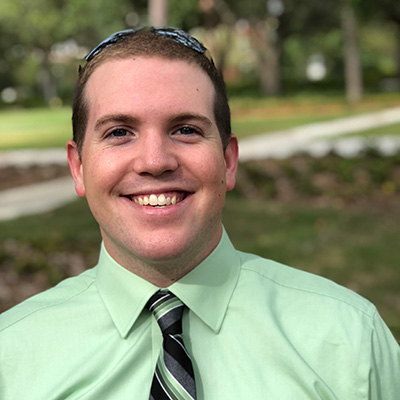
Meet Douglas T. Pfeffer
Assistant Teaching Professor, Mathematics
Preferred Pronouns: he/him
Phone: (813) 257-3521
Email: dpfeffer@ut.edu
Address: 401 W. Kennedy Blvd. Tampa, FL 33606
Mailbox: 3F
Building:
MKE
Room: 128
Education
2014 Florida Atlantic University, B.S.
2016 University of Florida, M.S.
2019 University of Florida, Ph.D.
Courses Taught
College Algebra
Calculus for Business
Precalculus
Discrete Mathematics for Computer Science
Calculus 2
College Geometry
Career Specialties
Douglas T. Pfeffer is a mathematician specializing in operator theory, real/complex analysis, and linear algebra, as well as their applications to fields such as probability and dynamical systems. Additionally, he is interested in math history, mathematical pedagogy and mathematical outreach.
Professional and Community Activities
Pfeffer's pure mathematical research program sees him investigate function algebras generated by imposing algebraic constraints on the classic disc algebra – functions holomorphic on the complex unit disc that extend to be continuous on the unit circle. For example, one can ask such functions have their first derivative vanish at zero – this constrained algebra is known as the Neil Algebra. Pfeffer's current work aims to establish a function theory for operators associated with these algebras. This has led to two co-authored publications: “Szego and Widom Theorems for finite codimensional subalgebras of a class of uniform algebra” in Complex Analysis and Operator Theory (2021) and “Spectra for Toeplitz Operators Associated with a Constrained Subalgebra” in Integral Equations and Operator Theory (2022). Since 2020, Pfeffer has also co-founded and co-organized the Operator Theory Talks for Early Researchers (OTTER) community, where early career researchers gather virtually to help one another navigate academia and make strides in their research. This involvement complements his yearly involvement in the Southeastern Analysis Meetings (SEAM).
Pfeffer's applied mathematical research programs are in the areas of probability and dynamical systems. The former sees him collaborating with the Department of Energy's Sandia National Labs on the development of a probabilistic framework to support the creation of human-made models of the human brain (see https://arxiv.org/abs/2309.07366 for a recent paper on this). The latter sees him collaborating with the Department of Energy's Oak Ridge National Labs on providing analytic error analysis on the convergence of data-driven surrogate models via the SINDy method (results TBA).
Since being an MAA Project NExT fellow (Silver ’19), he has also been involved in online communities centered on innovating the classroom using research-backed, equitable teaching techniques such as Inquiry-Based Learning, Standards-Based Grading, the Flipped Classroom and more. This has led to the recent publication of the co-authored book chapter “Double Integrals and the Human Condition” in Cross-Curricular Pure Math Applications (to appear in 2024 as a MAA Notes volume). He is also an ardent believer in outreach, where he organizes and teaches the virtual Tucson Math Circle for elementary school kids. These interests have led to the recent co-authored publication “From Mirrors to Wallpapers: A Virtual Math Circle Series on Symmetry” in the Journal of Math Circles (2023).
Honors and Awards
MAA Project NExT fellow (Silver ‘19)
